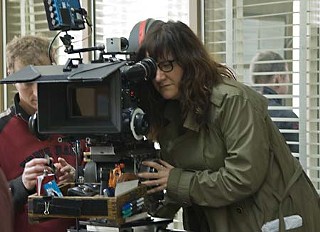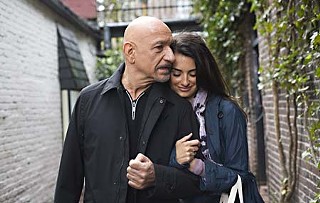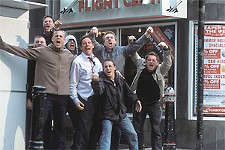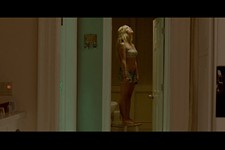The Chaos of Eros
Isabel Coixet's 'Elegy' for a dying animal
By Raoul Hernandez, Fri., Aug. 22, 2008
"Consume my heart away; sick with desire/And fastened to a dying animal/It knows not what it is." – Yeats in Philip Roth's The Dying Animal
"Adult" isn't a descriptor normally attached to pretension-impaired non-arthouse fare. And in the case of Elegy, based on Philip Roth's 2001 book, The Dying Animal, the May-December romance between adjunct professor David Kepesh and his student Consuela Castillo isn't "grownup" based exclusively on subject matter. After all, as inhabited by Ben Kingsley, serial collegiate predator Kepesh thrashes silently in a state of mortality-panicked immaturity. What brands Elegy for adults only is director Isabel Coixet's emotional objectivity.
"I know, I know," chuckles the Barcelona-born and -based director by phone from New York upon mention of the "A" word.
Like the two previous English-language films from Coixet (pronounced coe-shay), 2003's My Life Without Me and The Secret Life of Words two years later (she scripted both), Elegy's seamless manipulation of head and heart comes primarily through dialogue, in this case by screenwriter Nicholas Meyer (who previously adapted Roth in 2003's The Human Stain). Words and performances: Kingsley, project originator and leading lady Penélope Cruz, Dennis Hopper, Patricia Clarkson, Peter Sarsgaard, and Deborah Harry deliver note-perfect punctuation. Philip Roth's "chaos of eros," commitment, becomes orderly in the cinematic language of Coixet.
Austin Chronicle: Are you a fan of Philip Roth's?
Isabel Coixet: Yes. I know that here in the States he's very controversial, and I know all those accusations of misogyny and all that stuff. I'm a woman, and I'm very aware of what's happening with women in the world, but that doesn't stop me from admiring someone who's really a good writer. I think Roth's American Pastoral is probably one of the best novels of the last century. In Europe it's another perspective. People really, really admire and respect Philip Roth. In America, the literary critics really like his writing, but at the same time, the subjects are always touchy. I think here they don't appreciate him so much.
But for me he's a really good writer, and that's all that counts. With the subject of The Dying Animal, I knew what my point of view was about those types of relationships. I think David Kepesh is a dying animal, and even if he's trying desperately to make this woman an object, the reality and the physicality of that woman, of Consuela, is always there, and she's really fighting not to be an object. At the same time, she's very flattered because he keeps telling her, "You're a work of art," "You have the most amazing breasts ever." Any woman in the world will be flattered by that, and at the same time, you have to escape that definition, because if you're defined by your breasts – when that disappears, what's left of you?
AC: Dennis Hopper has a line in the film – "Beautiful women are invisible" – that makes you stop and think, because Penélope Cruz is not invisible. What were your thoughts on that line?
IC: [Chuckling] Every time Dennis Hopper said that line, I was saying: "What about ugly women? They're even more invisible." At the same [time], I think it's very clear. Consuela's beauty stops David from respecting her. It's like, "Okay, you're beautiful, your breasts are amazing, so you don't have a brain, and I can do whatever we want with you." I think that's a reality, and I just hope it's something that won't be a reality for my daughter, who's just a kid now and [laughing] who's listening to our conversation.
AC: A recent review of a Catherine Deneuve DVD set stated that she was essentially playing the most beautiful woman in the world in all her films. You couldn't just pretend she's not beautiful. Filmmakers have to play to that beauty in any narrative. Same thing with Penélope Cruz?
IC: Yes. That's one of the key moments in the film, when Consuela asks, "Who am I for you?" I think in that moment she's not that dumb student [taken in] by his talent. She's more mature than he is, more honest, and asking the right questions. In that moment he's just a kid, a 7-year-old with no answer. I work with very beautiful women in my life, and there are very few that live their beauty in a natural way. There are very few women who are comfortable with their beauty, especially actresses, because it's never enough. You're never beautiful enough. Your breasts are never perfect. If you ask Catherine Deneuve in the Sixties – and I know Catherine Deneuve – she was the most insecure woman ever. I also met Juliette Binoche and Jeanne Moreau, women who are icons. They always talk about their early years and being very insecure. Beauty doesn't make you happy. I don't know what makes you happy, but beauty is not one of the things.
AC: In Elegy, The Secret Life of Words, and My Life Without Me, mortality plays a pivotal role, and yet hope is inherent in your films, even if the situation isn't.
IC: For me, talking about death is a type of exorcism. I think I force myself to talk about death in my films because it's the way to say: "Okay, I know it's going to happen. I want to be prepared, and I want to prepare people. But I don't want to be afraid of it, because it's part of life." The more we try not to talk about it, the more frightening it is. But yes, in a way I'm very pessimistic, so I guess I force myself to be optimistic in my films.
AC: You're from Barcelona, your heritage is part French, and your last three films have been American. Where do your loyalties ultimately lie?
IC: I want to tell stories. That's all. Lately, I've had this terrible fear of flying, and I have to fly a lot. So every time I look from the plane to where I'm landing, in New York or in L.A. or in Moscow, I see all those people in all those little cars, in those little swimming pools, in those little houses, and I always think, "Wow, there's a lot of stories to be told." And yeah, I'm a kind of strange, outsider filmmaker. My next film is going to be in Tokyo, so I don't know. I'm a storyteller, and I hope I'm not going to be the last one.














